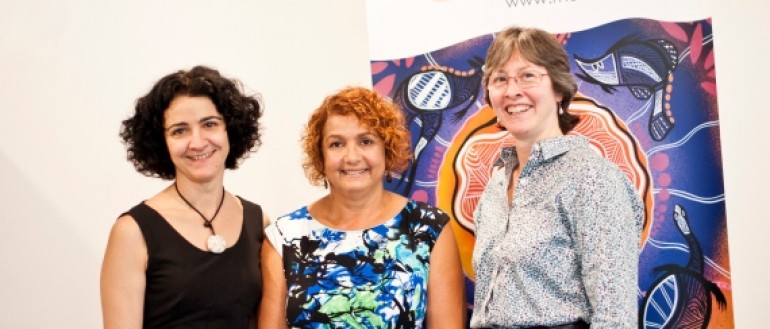Menzies’ senior principal research fellow, Professor Joan Cunningham, was recently awarded a research fellowship as part of the National Health and Medical Research Council’s (NHMRC) yearly multi-million dollar funding round.
Joan’s fellowship provides support for her salary for the next five years.
She shared her thoughts on the new funding.
What is the title of your project fellowship/project?
NHMRC Research Fellowship - Social and system determinants of Indigenous health: Closing the gap in outcomes for Indigenous Australians with cancer.
What major health issue does your research hope to address and how?
My work over the next five years is aimed at understanding and improving health services for Aboriginal and Torres Strait Islander people with cancer.
Cancer is the second leading cause of death for Indigenous Australians and accounts for more deaths every year than diabetes and kidney disease combined.
Cancer affects not only individuals, but families and communities as well, with potentially devastating effects on social and emotional wellbeing, economic security, and many other aspects of life.
Indigenous people who get cancer are less likely to survive than other Australians who get cancer, and health services have an important role to play in improving outcomes for Indigenous people with cancer.
My work will be done as part of a national Centre of Research Excellence (CRE) established last year to improve diagnosis, treatment and survival rates for Indigenous Australians with cancer.
I co-lead the CRE partnership with Associate Professor Gail Garvey and it has been appropriately named the Discovering Indigenous Strategies to improve Cancer Outcomes Via Engagement, Research Translation and Training (or DISCOVER-TT CRE).
What is the most exciting aspect of your funding win?
Being awarded a fellowship means that I can focus my time and energy on all the important work that needs to be done, rather than worrying about how my salary is going to be paid.
This area of work is also an important part of my core interest, equity in health and health care.
This funding allows me to pursue that along with a broad range of other projects in this area, including continued research on the epidemiology and treatment of kidney disease in Indigenous Australians, the health of Indigenous people in urban areas, and the impacts of racism and social and economic disadvantage on the health and wellbeing of Indigenous Australians.
What are the proposed details of your research methodology (sample numbers, sites etc)?
There will be several different projects, each of which will have its own methodology.
The program of work I will be involved in will address a number of important areas, including:
- How well the national cervical screening program works for Indigenous women
- What sorts of care and treatment Indigenous people with cancer are receiving, and whether these are consistent with best practice guidelines
- The impact of having other health problems on the treatment given to Indigenous people with cancer, and on whether they survive
- Indigenous cancer patients’ use of health care at the end of life and their needs for palliative care
- Whether the needs of Indigenous cancer patients are different to those of other cancer patients, and if so, in what ways
- How health services can develop and use better models of care for Indigenous cancer patients
- What role Indigenous cancer survivors can play in improving cancer awareness and outcomes for Indigenous cancer patients, and how this can best be supported.
How will Aboriginal and Torres Strait Islander people be engaged in this process?
As with all projects undertaken as part of the DISCOVER-TT CRE, this work will involve Indigenous people and organisations at all stages of the research process, from priority setting, planning and project design, through the conduct of the project, to feedback, dissemination and knowledge translation.
An Indigenous-majority advisory board provides high-level advice on broad priorities and principles underpinning the work of the CRE, including the projects in which I will be involved.
All of the projects will be national in scope and consider the needs and experiences of Aboriginal and Torres Strait Islander people in urban, regional, rural and remote settings. Depending on the project, participants will include Indigenous people with cancer, their families and carers, health service providers, consumer advocates, cancer survivors, and other stakeholders as relevant.
What are the broader health implications of your grant/fellowship?
Over the last several decades, survival from cancer has improved markedly for Australians overall, but Indigenous people with cancer have not benefitted to the same extent.
The work to be undertaken through this fellowship aims to improve the outcomes for Indigenous people with cancer by making health services work better for them.
This work may also benefit other people with cancer, and Indigenous people with other health conditions, by making health services more effective and responsive to the needs of all their patients.
For more information on this area of work please click here.
Image: Leading Indigenous cancer researchers Associate Professor Patricia Valery, Associate Professor Gail Garvey and Professor Joan Cunningham.

